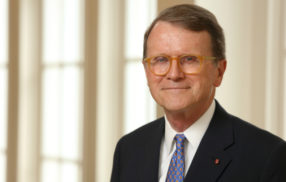
UVA Darden Dean Emeritus Bob Bruner’s Recommended Readings for 2019
By Jay Hodgkins
University of Virginia Darden School of Business Professor Bob Bruner has published his “Recommended Readings for 2019.”
Bruner, a University Professor and Darden’s dean emeritus, included nonfiction and fiction books on wide range of subjects from ancient history and poverty to financial crises and the rise and fall of nations in the annual list of recommendations from books he’s read this year.
A sampling of Bruner’s recommendations are listed below, and read his full reading list on his blog.
Fiction
Julian Barnes, The Sense of an Ending, is about the fraught relationship among two young men, a girlfriend between them, and the girlfriend’s mother. I’ll skip a summary of the plot, to avoid ruining the big reveal in the final pages of the book. The protagonist is now in his retirement years and reflects back on the tangle of relationships. At one point, he says, “My younger self had come back to shock my older self with what that self had been, or was, or was sometimes capable of being. And only recently I’d been going on about how the witnesses to our lives decrease, and with them our essential corroboration. Now I had some all too unwelcome corroboration of what I was, or had been.” People of a certain age gain the “sense of an ending,” from surprising revelations that explain paradoxes that had troubled one earlier in life.
Financial Crises
I enjoyed Reid Hundt’s, A Crisis Wasted: Barack Obama’s Defining Decisions. The book recounts the onset of the crisis of 2008, Obama’s election, and the efforts to frame a public policy agenda that would respond to the crisis and then address longstanding priorities of the Democratic Party. The book’s title alludes to a saying of Rahm Emmanuel (and others), “Never let a crisis go to waste,” that is, one should exploit the urgency of a crisis to pursue major reforms. Clearly, the Democrats enjoyed a rare opportunity, in which the same party occupied the White House and controlled both houses of Congress. Hundt, the former Chairman of the Federal Communications Commission during Bill Clinton’s presidency, served Obama as an adviser during the presidential campaign and on the transition team. The book steams with Hundt’s frustration over his inability to gain acceptance of dramatic new progressive programs: massive spending for infrastructure, clean energy, digital commons, and so on.
Ancient History
Barry Strauss’s, Ten Caesars: Roman Emperors from Augustus to Constantine, lends great perspective on the growth and collapse of the Roman Empire. Strauss focuses on the ten “best” emperors during this long period, writing that, “They were Rome’s most capable and successful emperors—or, in the case of Nero, at least one of the most titillating, and even he was a great builder.”
The West
Wallace Stegner’s, Beyond the Hundredth Meridian: John Wesley Powell and the Second Opening of the West, tells the history of early exploration of the Grand Canyon and of the government policy issues that the exploration served up. Powell was an amateur explorer who obtained modest support from the U.S. government by proposing to gain insights to help settlement of the West and commercial navigation of the Colorado River. The river proved to be unnavigable (there were/are dozens of serious rapids from the headwaters to the mouth). But Powell’s two trips down the Colorado converted him into an early anthropologist (to preserve Native American culture) and a conservationist. Stegner’s biography of Powell is a metaphor for the sea change in American sentiment in the 19th Century, from exploitation of natural resources, toward conservation.
The Rise and Decline of Nations
Paul M. Kennedy’s The Rise and Fall of the Great Powers: Economic Change and Military Conflict from 1500 to 2000 is a classic in the field, first published in 1987 and subsequently updated through 2000. Through detailed examination of the rise and fall of major nations over 500 years, Kennedy persuasively argues for a relationship between a nation’s “general economic and productive balances and the position occupied by individual powers in the international system.” In other words, economic productivity is foundational to influence in the world. The rise of Britain as the global hegemon in the 19th century, and the advance of the U.S. after World War II draw special examination by Kennedy. This is a very big book, through which the reader might labor. But the investment of time and effort is well worth it—and is highly relevant today as the unipolar world led by the U.S. begins to shift toward a multipolar world in which the U.S., China, Euroland, and perhaps India vie for advantage.
The Alternative Narrative About Capitalism
Readers of this blog will note my past recommendations of books that cast capitalism in sharp light: Marx, Piketty, activists and reformers of various ills. Business leaders and scholars should pay attention to criticisms of capitalism. But what can capitalism say for itself? Two recent books offer stimulating replies. Tyler Cowen’s Big Business: A Love Letter to an American Anti-Hero is probably the most readable and comprehensive response to critics of big business that I’ve seen. He argues that “business at its best is a fundamentally ethical enterprise” — no more fraudulent than the rest of us; not overly generous to CEOs; the source of work that can be fulfilling (even if not necessarily fun); corporate influence in Washington is overrated and so are political contributions by corporations. Cowen acknowledges that the growing concentration of competition in certain fields (such as air travel and health care) warrants scrutiny, as does the threat to privacy by big tech. Unlike the banal literature that cheerleads for capitalism, Cowen cites credible data and research in support of his points. If Cowen’s argument makes you queasy or angry, then you should read this book. And if you find yourself getting caught in debates about the value of capitalism, this book would be a handy reference.
The University of Virginia Darden School of Business prepares responsible global leaders through unparalleled transformational learning experiences. Darden’s graduate degree programs (MBA, MSBA and Ph.D.) and Executive Education & Lifelong Learning programs offered by the Darden School Foundation set the stage for a lifetime of career advancement and impact. Darden’s top-ranked faculty, renowned for teaching excellence, inspires and shapes modern business leadership worldwide through research, thought leadership and business publishing. Darden has Grounds in Charlottesville, Virginia, and the Washington, D.C., area and a global community that includes 18,000 alumni in 90 countries. Darden was established in 1955 at the University of Virginia, a top public university founded by Thomas Jefferson in 1819 in Charlottesville, Virginia.
Press Contact
Molly Mitchell
Associate Director of Content Marketing and Social Media
Darden School of Business
University of Virginia
MitchellM@darden.virginia.edu






